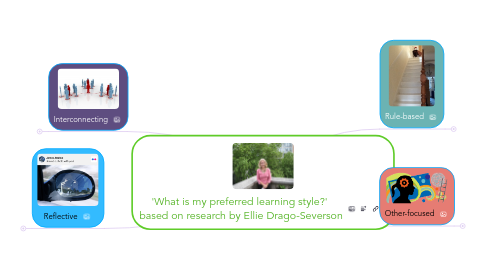
1. Interconnecting
1.1. my priority
1.1.1. reflecting on my identity, being open to others' views and to changing myself
1.2. my concerns
1.2.1. set goals in collaboration
1.2.2. share power
1.2.3. find common ground, even with seeming opposites
1.2.4. open to exploration, conflict, complexity and others' perspectives
1.3. my guiding questions
1.3.1. how can other people's thinking help me to develop and grow?
1.4. what I could do more of
1.4.1. accept that some differences cannot be resolved
1.4.2. avoid insisting on absolutely flat, nonhierarchical approaches
1.4.3. appreciate the time it takes to reach a conclusion when others may not move at the same pace
1.5. a helpful tutor or manager will ...
1.5.1. encourage me to refrain from taking over and rushing a process
1.5.2. set example of showing sensitivity to those who do not have the same capacity (eg for conflict)
2. Reflective
2.1. my priority
2.1.1. staying true to my values, which I generate
2.2. my concerns
2.2.1. set goals based on own values and standards
2.2.2. self-image based on my evaluation of my competencies and integrity
2.2.3. contradictory feelings and conflict are ways to learn
2.3. my guiding questions
2.3.1. am I staying true to my own personal integrity, standards, and values?
2.4. what I could do more of
2.4.1. open up to diverse and opposing views
2.4.2. accept and learn from diverse problem-solving approaches
2.4.3. facilitate dialogue, especially when perspectives are diametrically opposed
2.5. a helpful tutor or manager will ...
2.5.1. offer opportunities to promote, analyse, and critique my goals and ideas
2.5.2. encourage consideration of conflicting or discordant ideas
3. Rule-based
3.1. my priority
3.1.1. fulfill my own needs, interests and desires
3.2. my concerns
3.2.1. clear guidelines or rules
3.2.2. clear definition of right and wrong
3.2.3. immediate self-interest
3.2.4. other people are either helpful or obstacles
3.2.5. abstract thinking has no or little meaning
3.3. my guiding questions
3.3.1. will I get punished?
3.3.2. what's in it for me?
3.4. what I could do more of
3.4.1. be open to possibility of new 'right' solutions
3.4.2. take on tasks that demand abstract thinking
3.4.3. engage in dialogues that offer multiple perspectives and go beyond 'right' and 'wrong'
3.5. a helpful tutor or manager will ...
3.5.1. set clear goals and expectations
3.5.2. offer concrete advice, focus on specific skills
3.5.3. agree on step-by-step procedures and specific due dates
3.5.4. show positive examples of being open to new and alternative options or solutions
4. Other-focused
4.1. my priority
4.1.1. meet expectations and get approval
4.2. my concerns
4.2.1. authority figures set goals
4.2.2. self-image comes from other's judgement
4.2.3. responsible for others' feelings and vice versa
4.2.4. criticism and conflict are threatening
4.3. my guiding questions
4.3.1. will you like / value me?
4.3.2. will you think I am a good person?
4.4. what I could do more of
4.4.1. accept conflicting view-points without seeing them as a threat to relationships
4.4.2. generate own values and standards
4.4.3. engage in dialogue that helps to generate and clarify my values
4.4.4. share perspectives in pairs or triads before sharing with larger groups and authority figues
4.5. a helpful tutor or manager will ...
4.5.1. invite me to take on leadership roles
4.5.2. show positive example of expressing disagreement without threat to relationships
